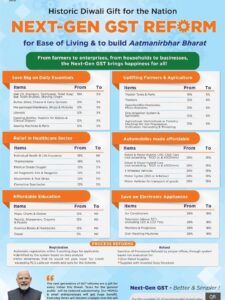North-East Chief Ministers hailed the Centre’s Next-Generation GST reforms, calling them historic and citizen-centric. With simplified tax slabs, cheaper goods, MSME support, and healthcare relief, leaders said the reforms would ease compliance, create jobs, and boost livelihoods, strengthening India’s economy under Prime Minister Narendra Modi’s leadership.
The Centre’s latest reforms in the Goods and Services Tax (GST) regime have drawn widespread appreciation from the Chief Ministers and leaders of several North-Eastern states, who hailed the move as a “historic step” that would strengthen India’s economy, ease compliance, and provide direct benefits to citizens and businesses alike.
On Thursday, Chief Ministers of Tripura, Arunachal Pradesh, Nagaland, Assam, and other states of the North-East commended the Union Government’s decision to introduce what has been termed the Next-Generation GST Reforms. According to them, the revised tax structure is expected to boost livelihoods, empower Micro, Small, and Medium Enterprises (MSMEs), and enhance economic prosperity across various sectors.
Tripura CM Dr. Manik Saha Welcomes GST Reforms
Tripura Chief Minister Dr. Manik Saha was among the first to welcome the reforms, noting that Prime Minister Narendra Modi had hinted at these transformative steps during his Independence Day address from the Red Fort.

Speaking to the media, Dr. Saha thanked the Prime Minister and Union Finance Minister Nirmala Sitharaman for the sweeping changes in the tax system. He described the reforms as a “game-changer” for common citizens, small traders, and entrepreneurs.
“The GST reforms would make life easier and people would be hugely benefited. Along with the common men, businessmen and traders would also gain from the reforms. For the interest of the common men and various sectors, the Modi government has been carrying out one reform after another. These steps reflect the vision of Prime Minister Modi Ji’s Next-Generation GST framework,” said Dr. Saha.
He highlighted key features of the reform package, including:
Two simplified tax slabs: 5% and 18%
Cheaper goods for the middle class
Faster refunds for exporters
Simplified registration for MSMEs
Relief for the healthcare sector
“These reforms will benefit every section of society, including farmers, small traders, women, youth, and entrepreneurs. It is a decisive step towards ease of living, ease of doing business, and strengthening India’s economy,” Dr. Saha added.
Arunachal Leaders Call It a Historic Step
Arunachal Pradesh Chief Minister Pema Khandu and Deputy Chief Minister Chowna Mein also lauded the reforms, calling them “historic” and aligned with Prime Minister Modi’s vision of creating an economy that promotes both ease of living and ease of doing business.
According to Khandu, the simplified structure will significantly reduce compliance burdens, empower entrepreneurs in remote regions, and provide a much-needed push to small businesses that serve as the backbone of Arunachal Pradesh’s economy.
Nagaland CM Neiphiu Rio Praises Citizen-Centric Approach
Nagaland Chief Minister Neiphiu Rio also welcomed the reforms. Taking to social media platform X, he wrote:
“My sincere appreciation to the Hon’ble Prime Minister Narendra Modi Ji and Union Finance Minister Nirmala Sitharaman Ji for introducing the Next-Gen GST Reform. This citizen-centric initiative simplifies the tax structure, eases compliance, supports MSMEs, and strengthens India’s economic growth.”
Rio emphasized that North-East states, with their growing trade and entrepreneurial ecosystem, stand to gain immensely from a simpler and more business-friendly GST framework.
Manipur’s Former CM N Biren Singh Highlights Job Creation
Former Manipur Chief Minister N Biren Singh also hailed the Centre’s initiative, saying the reforms would “empower small businesses, create jobs, and bring relief to families.” Singh stressed that for a state like Manipur, which has a strong base of small traders and family-run businesses, GST reforms would provide much-needed financial breathing space.
Assam CM Himanta Biswa Sarma Focuses on Consumption and Growth
In Assam, Chief Minister Himanta Biswa Sarma described the GST reforms as a significant step that would “boost small and medium businesses, spur job creation, increase consumption, and most importantly, leave more money in the hands of our people.”
He added that reforms such as faster refunds and easier compliance would help entrepreneurs expand operations and encourage more young people to enter the business sector.
Broader Economic Impact
Experts believe that the reforms will create a ripple effect across the Indian economy. By cutting down tax slabs to just two (5% and 18%), compliance becomes simpler, reducing the burden on businesses while lowering costs for consumers.
With provisions aimed specifically at MSMEs—such as easier registration and faster refunds—the reforms are expected to encourage entrepreneurship and innovation, particularly in regions like the North-East, where small businesses play a central role in employment generation.
The healthcare sector is also expected to benefit, with reduced GST rates on essential medical equipment and services, thereby making healthcare more affordable.
| Also Read: GST Council’s historic reform to ease living and doing business |
The unified voices of North-Eastern Chief Ministers underscore the broader sentiment that GST reforms represent a step toward inclusive growth, citizen welfare, and economic stability. As India prepares for the next phase of development, these reforms are positioned as a catalyst for not only enhancing ease of doing business but also ensuring ease of living for millions.













